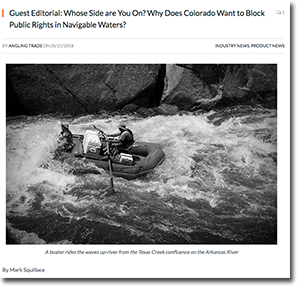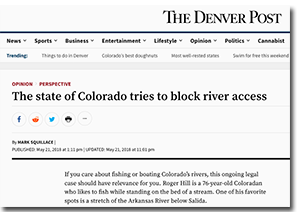The Heart of the Matter: Navigability, Equal Footing Principle, Waterway Bed Title
 If you’ve not read about this issue yet, here’s the core of the dispute as outlined by attorney Mark Squillace in Angling Trade here. From the article (emphasis mine) –
If you’ve not read about this issue yet, here’s the core of the dispute as outlined by attorney Mark Squillace in Angling Trade here. From the article (emphasis mine) –
Roger Hill is a 76-year old Coloradan who likes to fish while standing on the bed of the stream. One of his favorite spots is a stretch of the Arkansas River near Texas Creek. A local landowner claims that Roger is trespassing when he stands on the bed adjacent to the landowner’s property, and the landowner has repeatedly harassed Roger while he is fishing, throwing rocks at him and leaving threatening notes on his car. The landowner even shot at one of Roger’s fishing buddies. Fortunately, no one was hit, but the landowner did time in jail for that little stunt.
Roger claims a right to fish from the bed on the grounds that the stretch of the Arkansas River where he fishes is navigable and that Colorado thus owns the bed of the stream. If Roger is right in claiming that the Arkansas River is navigable, then he stands on firm legal ground, but he does not want to risk getting shot to prove his point. So, Roger sued the landowner. Now, Colorado has moved to have the case dismissed, not because the Arkansas River is not navigable, but rather because the State claims it is an indispensable party to any case determining title to the bed of the Arkansas River, but further that it cannot be made a party without its consent. Mind you, the State could simply waive its claim of immunity to suit and allow people like Roger to protect their legal right to fish. Instead the State is actively seeking to block Roger’s claim that he has the right to access navigable streams.
The notion that States own the bed of navigable streams derives from a constitutional principle known as the “equal footing doctrine.” It provides that when States enter the Union they do so on an “equal footing” with other States. Among the rights that States secure when they become States is title to the bed of all navigable streams and lakes. Despite the fact that Colorado is home to many substantial rivers and streams none have ever been officially declared “navigable” for purposes of determining title to the bed. This is a much bigger problem in Colorado than in most States because most States afford the public reasonably broad access rights whether or not they meet the federal navigability test. Indeed, in Colorado, you are deemed a trespasser if you merely float over the river bed adjacent to private property. As a result, Colorado recreation boaters and fisherman use Colorado’s waterways at the sufferance of private landowners. One good way around this problem, at least for Colorado’s larger rivers and streams, is to have them declared “navigable” for title purposes and that is what Roger Hill is seeking to do on the Arkansas River.
More Regional Media Coverage of the Arkansas River Dispute
 From the Denver Post this article – The State of Colorado Tries to Block River Access, an opinion piece by attorney Squillance published back on 21 May; worth a read even if just for the comments…
From the Denver Post this article – The State of Colorado Tries to Block River Access, an opinion piece by attorney Squillance published back on 21 May; worth a read even if just for the comments…
Another piece in the The Pueblo Chieftain from 13 May – Who Owns the Arkansas? Property Owners, Outdoor Enthusiasts Battle Over Access.
Maybe It’s Time to Truly Clarify the Access Issues in Colorado
I don’t have dog in the Colorado access issues personally; after an experience similar to Mr. Hill’s very early in my fishing career in Colorado, I’ve honestly never gone back, preferring the much more favorable (and beloved) regs in Montana and Wyoming.
Perhaps it’s time for citizens to speak up at the ballot box in November, and maybe even organize formally along the lines of the Utah Stream Access Coalition, with a goal of clarifying – and improving – access regs…

